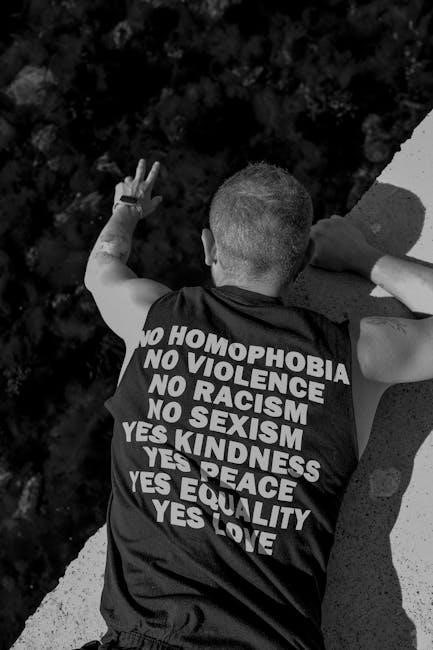Hunger: A Memoir of (My) Body by Roxane Gay is a powerful exploration of identity, trauma, and societal expectations. Gay shares her deeply personal journey, weaving together themes of body image, race, and gender, while offering a raw, unflinching look at her experiences with weight, food, and self-acceptance. Through lyrical prose, she confronts the complexities of living in a body that defies conventional norms, creating a narrative that resonates with universal themes of vulnerability and resilience.
Overview of Roxane Gay’s Memoir
Hunger: A Memoir of (My) Body by Roxane Gay is a deeply personal and unflinching exploration of her life, body, and identity. The memoir delves into her experiences with obesity, trauma, and societal expectations, offering a raw and honest narrative about living in a body that defies conventional norms. Gay examines themes of food, weight, and self-acceptance, weaving together personal anecdotes with broader cultural critiques. Unlike traditional memoirs that often celebrate triumph over adversity, Hunger presents a nuanced and unromanticized portrayal of her journey. Through her lyrical prose, Gay challenges readers to confront their own biases and understand the complexities of embodiment. This memoir is a powerful exploration of resilience, vulnerability, and the enduring impact of trauma on identity.
Themes and Key Messages in the Book
Hunger by Roxane Gay delves into profound themes of body image, identity, and societal expectations. Gay explores how her body has shaped her experiences, addressing issues like obesity, trauma, and food addiction. She critiques cultural norms that marginalize bodies deemed “unacceptable,” while advocating for self-acceptance and resilience. The memoir also examines the intersectionality of race and gender, highlighting how these factors compound the challenges she faces. Central to the book is the idea that hunger—both physical and emotional—cannot be separated from societal judgments. Gay’s unflinching honesty challenges readers to confront their own biases, offering a narrative that is both deeply personal and universally relatable, encouraging empathy and understanding of diverse body experiences.
The Personal Journey of Roxane Gay

Roxane Gay’s memoir Hunger traces her deeply personal journey of living in a body marked by trauma and societal stigma. Surviving a violent act in her youth, Gay turned to food as a coping mechanism, leading to significant weight gain. Her journey is one of pain, self-discovery, and resilience, as she grapples with the intersection of her body and identity. Gay confronts the emotional and psychological struggles of feeling unseen and marginalized, yet her narrative is also one of growth. Through her writing, she seeks to reclaim her body and voice, offering a poignant reflection on what it means to exist in a world that often seeks to erase or diminish her. Her story is a testament to the strength found in vulnerability and self-acceptance, resonating deeply with readers.
Structure and Style of the Memoir
Hunger is crafted with lyrical prose and a non-linear narrative, blending personal anecdotes with reflective commentary. Gay’s intimate writing style creates a raw, emotional connection with readers.
Lyrical Prose and Narrative Flow
Roxane Gay’s Hunger captivates readers with its lyrical prose, weaving vivid imagery and emotional depth. The narrative flows non-linearly, mirroring Gay’s internal journey, creating a powerful, immersive experience that draws readers into her world of struggle and resilience.
Use of Personal Anecdotes

Roxane Gay’s Hunger is deeply rooted in personal anecdotes, offering an intimate and unflinching look into her life. She shares stories of childhood trauma, struggles with body image, and the complexities of food as both comfort and torment. These anecdotes are raw and honest, allowing readers to connect with her vulnerability. Gay’s use of personal narratives creates a sense of immediacy, making her experiences feel both deeply personal and universally relatable. Through these stories, she explores themes of identity, resilience, and the societal pressures that shape how we view our bodies. The anecdotes are not just a reflection of her past but also a testament to her ongoing journey of self-discovery and healing.

Exploration of Body Image and Food
Roxane Gay’s Hunger delves into her complex relationship with food and body image, revealing how societal expectations and personal trauma shape her experiences with weight and identity.
The Intersection of Race and Gender
Roxane Gay examines how race and gender intersect with her body image, highlighting the unique challenges faced by Black women in a society dominated by white, patriarchal beauty standards. Gay’s narrative critiques the marginalization of Black women’s bodies, emphasizing the double burden of racism and sexism. She shares personal anecdotes about societal expectations and judgment, illustrating how these forces contribute to her struggles with self-acceptance. By addressing these intersections, Gay challenges readers to confront the broader cultural issues that perpetuate body shaming and discrimination. Her voice is both a powerful critique and a call for change, urging a reevaluation of how we view and treat bodies at the margins of society.
Psychological and Emotional Struggles
Roxane Gay delves into the profound psychological and emotional struggles tied to her body, revealing the deep-seated pain and self-consciousness that have shaped her life. Her memoir illustrates how societal expectations and personal trauma have fueled her complicated relationship with food and her body. Gay openly discusses the emotional toll of being judged and marginalized, as well as the internalized shame and self-loathing she has grappled with. Through her narrative, she explores the emotional cycles of hunger—both physical and emotional—and the ways in which these struggles have influenced her sense of self-worth. Her honesty offers a poignant reflection on the resilience required to navigate a world that often seeks to erase or diminish bodies like hers.
Trauma and Healing
Roxane Gay’s memoir confronts the profound impact of trauma on her life, exploring how her body became a vessel for pain and resilience. Through writing, she seeks healing.
The Role of Trauma in Shaping Identity
Roxane Gay’s Hunger delves into how traumatic experiences profoundly shaped her identity. The memoir reveals the lasting emotional and psychological scars left by a violent act in her youth, which she describes as a defining moment. Gay’s narrative illustrates how trauma can influence self-perception, particularly in relation to her body. She explores the struggle to reconcile her inner self with her physical form, highlighting the complex interplay between pain and resilience. Through her story, Gay shows how trauma can both fracture and fortify one’s sense of self, creating a deeply personal and universal exploration of identity.
Healing Through Writing and Self-Reflection
In Hunger, Roxane Gay uses writing as a therapeutic tool to confront her past and navigate her path toward healing. Through raw, introspective prose, she examines the emotional and psychological scars left by trauma, transforming pain into a narrative of resilience. Gay’s self-reflection reveals how the act of writing became a means of reclaiming her voice and understanding her body. By sharing her struggles openly, she illustrates the power of storytelling as a form of catharsis. This memoir not only chronicles her journey but also serves as a testament to the healing potential of self-expression, offering readers a deeply personal yet universally relatable exploration of recovery and growth.

Identity and Societal Expectations
Roxane Gay’s memoir delves into the tension between self-perception and societal expectations, particularly regarding race, gender, and body image. She critiques norms that marginalize and objectify, advocating for authenticity over conformity. Gay’s journey reflects the struggle to reconcile personal identity with external pressures, emphasizing resilience and the importance of challenging oppressive systems. Her narrative underscores the societal conditioning that shapes self-worth and the liberation found in embracing one’s true self, despite expectations. This theme resonates deeply, offering a powerful critique of how identity is perceived and policed in contemporary culture.
Challenging Societal Norms
Roxane Gay’s memoir boldly confronts societal norms surrounding body image, race, and gender, questioning the narrow definitions of acceptability imposed by culture. She critiques the marginalization of fat bodies, challenging the stigma and invisibility often forced upon them. Gay’s narrative refuses to conform to traditional expectations, instead amplifying the voices of those silenced by societal judgment. By sharing her personal struggles, she dismantles the notion that bodies must fit into predetermined categories to be valued. Her work sparks critical conversations about identity, urging readers to rethink their assumptions about worthiness and beauty. Gay’s unapologetic stance demands a reevaluation of how society perceives and treats diverse bodies, advocating for inclusivity and acceptance.
Embracing Individuality
Roxane Gay’s memoir is a testament to the power of self-acceptance and embracing one’s true identity. She rejects societal expectations of how bodies should look or behave, advocating for a world where individuality is celebrated. Gay’s narrative encourages readers to break free from the constraints of conformity, particularly in relation to body image. By sharing her own journey of self-discovery, she empowers others to embrace their uniqueness, even in the face of judgment or marginalization. Her work challenges the notion that bodies must conform to narrow standards of beauty or worth, fostering a sense of resilience and self-love. Gay’s story is a powerful reminder that true strength lies in embracing who we are, unapologetically.
Cultural and Literary Impact
Roxane Gay’s “Hunger” has significantly influenced contemporary memoir literature, sparking vital conversations on body image, race, and gender, and is celebrated as a courageous and impactful work.
Reception and Reviews of the Book
Hunger: A Memoir of (My) Body has received widespread critical acclaim for its raw honesty and unflinching exploration of body image, trauma, and identity. Critics have praised Roxane Gay’s lyrical prose and her ability to confront painful truths with vulnerability and courage. The book has been hailed as a triumph of personal storytelling, resonating deeply with readers who appreciate its unapologetic voice. Many reviewers have noted how Gay’s work challenges societal norms and fosters essential conversations about fatness, race, and gender. The memoir has solidified its place in contemporary literature, earning its reputation as a powerful and thought-provoking read. Its impact continues to grow, inspiring dialogue and self-reflection worldwide.
Contribution to Contemporary Memoir Literature
Hunger: A Memoir of (My) Body has significantly influenced contemporary memoir literature by offering a bold, unflinching narrative about body image, trauma, and identity. Roxane Gay’s lyrical prose and courageous storytelling have set a new standard for personal narratives, encouraging authors to explore themes of vulnerability and resilience. The memoir’s focus on intersectional identity—interweaving race, gender, and body politics—has expanded the scope of memoir writing, inspiring a new wave of writers to address marginalized experiences. Its impact lies in its ability to challenge societal norms while fostering empathy and understanding, making it a landmark work in the genre. Gay’s work continues to resonate, shaping the future of memoir literature with its authenticity and depth.

Hunger: A Memoir of (My) Body by Roxane Gay is a profound and deeply personal exploration of identity, trauma, and societal expectations. Through her lyrical prose, Gay confronts themes of body image, race, and gender, offering a raw yet universal narrative of resilience and vulnerability. The memoir’s impact lies in its unflinching honesty and its ability to challenge societal norms, fostering empathy and understanding. As a cultural critic, Gay’s work resonates broadly, making Hunger a significant contribution to contemporary memoir literature. Its exploration of the human experience has left a lasting mark, ensuring its relevance for years to come.